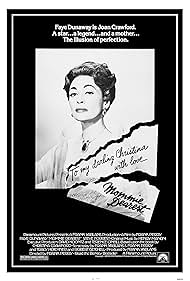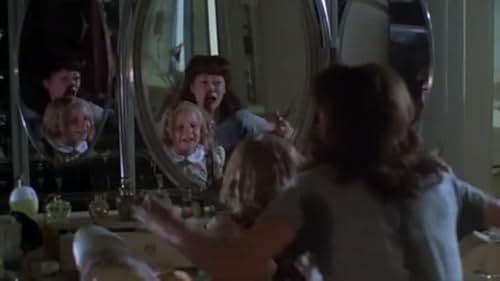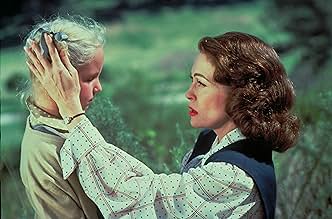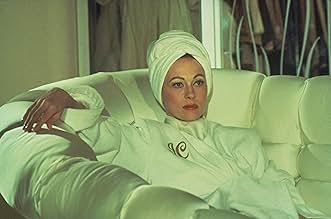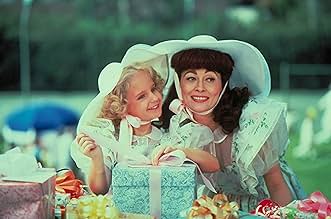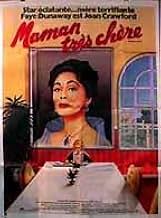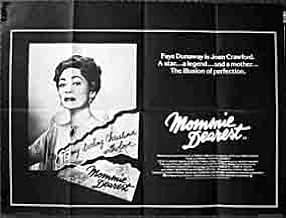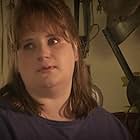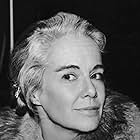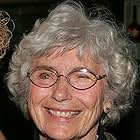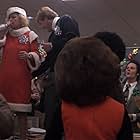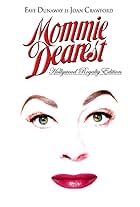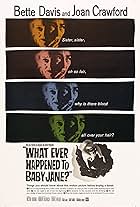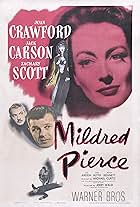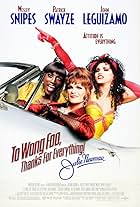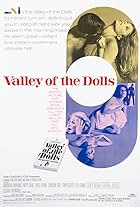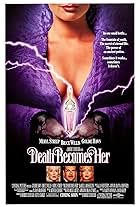The abusive and traumatic adoptive upbringing of Christina Crawford at the hands of her mother, screen queen Joan Crawford, is depicted.The abusive and traumatic adoptive upbringing of Christina Crawford at the hands of her mother, screen queen Joan Crawford, is depicted.The abusive and traumatic adoptive upbringing of Christina Crawford at the hands of her mother, screen queen Joan Crawford, is depicted.
- Awards
- 9 wins & 11 nominations
Storyline
Did you know
- TriviaFaye Dunaway mentions in her autobiography that she screamed herself hoarse during the filming for the notorious wire hanger tantrum scene in this movie. She called Frank Sinatra for help, and he gave her some pointers on how to get her voice back into shape.
- GoofsWhen Joan Crawford substitutes for her daughter on a soap opera, producer of show gives her a pep talk during a commercial, indicating it was a live broadcast. In reality 'The Secret Storm' was taped and director later said Crawford's performance was so poor he had to patch it together in editing room. Although it was recorded, The Secret Storm was "live tape", meaning that it was treated as if it were a live broadcast. At the end of each act, the actors stopped for the exact length of the commercials and then resumed taping.
- Quotes
[addressing the men in the Pepsi boardroom]
Joan Crawford: Don't fuck with me fellas. This ain't my first time at the rodeo.
- Alternate versionsDue to the damage on the film's master, all current video/television prints are missing the dramatic music as Joan destroys her rose garden.
- SoundtracksI'm Sitting On Top Of The World
by Sam Lewis, Joe Young (as Young) & Ray Henderson (as Henderson)
Featured review
There are cult movies and then there are cult movies. Some films to which this term has been applied are indeed unjustly neglected masterpieces. Others are rubbish, justly neglected by all except their devotees who loudly maintain that the critics and the public are ignorant Philistines who do not recognise a masterpiece when they see one. "Mommie Dearest", however, is the sort of cult movie that even its cultists do not claim as a masterpiece. It has acquired the reputation of a "guilty pleasure", an expression which can generally be translated as "the sort of film which nobody really likes but which certain people enjoy watching in order to snigger at how bad it is".
The film seems to have started acquiring its dubious reputation almost as soon as it was released in 1981. The critics were less than enthusiastic- Roger Ebert wrote "I can't imagine who would want to subject themselves to this movie". It performed relatively well at the box-office, but that might have been due to the decision by Paramount, realising that they had a potential turkey on their hands, to change their marketing strategy halfway though its run, advertising it as an over-the-top camp comedy. It received five "Razzie" awards, including Worst Picture, Worst Screenplay, and Worst Actress (a tie) for Faye Dunaway. Nine years later it achieved further infamy when the organisers of the Razzies voted it "Worst Picture of the Decade".
I think that the main problem is that the film relies on one single, highly partisan, source, never a good way to produce a biography, whether written or filmed. A year after Joan Crawford died in 1977 her adopted daughter Christina published her memoir "Mommie Dearest" which painted Joan as a cruel and abusive mother with an uncontrollable temper. Christina's allegations unleashed a heated controversy, in which many leading Hollywood figures took part, and many of Joan's friends and colleagues came forward to defend her reputation, as did her first husband Douglas Fairbanks junior and Christina's adoptive sisters Cynthia and Catherine. Some, however, supported Christina, including Crawford's old enemy Bette Davis. The film adaptation, which followed three years later, was bound to be equally controversial
Because of its reliance on a single source, the film is not, and does not aim to be, a comprehensive biography of Joan Crawford. It does not deal at all with Crawford's life before she adopted Christina in 1939. Even after that date there are some curious omissions. No mention is made of Joan's brief marriage in the forties to actor Philip Terry, and Cynthia and Catherine are omitted altogether, doubtless because they refused to support their sister's claims. Her brother Christopher, however, who did support her, does appear. Some of Christina's allegations are referred to, others are not. There is plenty in the film about Joan's alleged cruelty, violent temper and alcoholism, and her various male lovers are much in evidence, but the film is silent on her supposed bisexuality, which Christina also mentioned in her book. Some of the women with whom Joan supposedly enjoyed lesbian affairs were still alive in 1981, and the studio doubtless did not want to risk a libel suit.
In the 1970s Dunaway was one of Hollywood's leading stars, but her career went into something of a decline in the eighties, and some have placed the blame on the poor reception given to this film. She did, however, make a number of poor career choices during this decade, and some of her films, such as "The Wicked Lady" and "Supergirl", were considerably worse than this one. In fact, her performance here is not particularly bad, and I cannot see what she did to earn that Razzie award. To bracket it together with Bo Derek's appalling contribution in "Tarzan of the Apes" (the two tied for "Worst Actress") was an insult she did not deserve. Certainly, her performance is often hysterical and over-the-top, particularly during the notorious "no wire coat-hangers" scene, but if Christina Crawford is to be believed her adoptive mother was a hysterical, over-the-top sort of person, so the role could not really have been played in any other way.
The child actress Mara Hobel is enchanting as the young Christina, but one person who did deserve her Razzie was Diana Scarwid for "Worst Supporting Actress" as the adult Christina. Scarwid, 26 at the time, was required to portray Christina from her early teens to her late thirties, and makes a singularly unconvincing teenager, although she is pretty wooden even in the later scenes. None of the other actors really stand out, although at least they do not stand out for the wrong reasons.
Overall, I did not find "Mommie Dearest" to be anywhere near as bad as its detractors have made out. Its factual accuracy has been challenged, but a controversial film is not automatically a bad one. It is notable that the film was made by Paramount, the only major studio for which Crawford never worked. (The likes of MGM and Warner Bros doubtless owed her too much loyalty to get involved). It seems to me quite possible that the film's contemporary unpopularity may have been, at least in part, due as much to Hollywood's distaste for Christina's allegations as to any lack of talent on the part of the film-makers and actors involved. 6/10
The film seems to have started acquiring its dubious reputation almost as soon as it was released in 1981. The critics were less than enthusiastic- Roger Ebert wrote "I can't imagine who would want to subject themselves to this movie". It performed relatively well at the box-office, but that might have been due to the decision by Paramount, realising that they had a potential turkey on their hands, to change their marketing strategy halfway though its run, advertising it as an over-the-top camp comedy. It received five "Razzie" awards, including Worst Picture, Worst Screenplay, and Worst Actress (a tie) for Faye Dunaway. Nine years later it achieved further infamy when the organisers of the Razzies voted it "Worst Picture of the Decade".
I think that the main problem is that the film relies on one single, highly partisan, source, never a good way to produce a biography, whether written or filmed. A year after Joan Crawford died in 1977 her adopted daughter Christina published her memoir "Mommie Dearest" which painted Joan as a cruel and abusive mother with an uncontrollable temper. Christina's allegations unleashed a heated controversy, in which many leading Hollywood figures took part, and many of Joan's friends and colleagues came forward to defend her reputation, as did her first husband Douglas Fairbanks junior and Christina's adoptive sisters Cynthia and Catherine. Some, however, supported Christina, including Crawford's old enemy Bette Davis. The film adaptation, which followed three years later, was bound to be equally controversial
Because of its reliance on a single source, the film is not, and does not aim to be, a comprehensive biography of Joan Crawford. It does not deal at all with Crawford's life before she adopted Christina in 1939. Even after that date there are some curious omissions. No mention is made of Joan's brief marriage in the forties to actor Philip Terry, and Cynthia and Catherine are omitted altogether, doubtless because they refused to support their sister's claims. Her brother Christopher, however, who did support her, does appear. Some of Christina's allegations are referred to, others are not. There is plenty in the film about Joan's alleged cruelty, violent temper and alcoholism, and her various male lovers are much in evidence, but the film is silent on her supposed bisexuality, which Christina also mentioned in her book. Some of the women with whom Joan supposedly enjoyed lesbian affairs were still alive in 1981, and the studio doubtless did not want to risk a libel suit.
In the 1970s Dunaway was one of Hollywood's leading stars, but her career went into something of a decline in the eighties, and some have placed the blame on the poor reception given to this film. She did, however, make a number of poor career choices during this decade, and some of her films, such as "The Wicked Lady" and "Supergirl", were considerably worse than this one. In fact, her performance here is not particularly bad, and I cannot see what she did to earn that Razzie award. To bracket it together with Bo Derek's appalling contribution in "Tarzan of the Apes" (the two tied for "Worst Actress") was an insult she did not deserve. Certainly, her performance is often hysterical and over-the-top, particularly during the notorious "no wire coat-hangers" scene, but if Christina Crawford is to be believed her adoptive mother was a hysterical, over-the-top sort of person, so the role could not really have been played in any other way.
The child actress Mara Hobel is enchanting as the young Christina, but one person who did deserve her Razzie was Diana Scarwid for "Worst Supporting Actress" as the adult Christina. Scarwid, 26 at the time, was required to portray Christina from her early teens to her late thirties, and makes a singularly unconvincing teenager, although she is pretty wooden even in the later scenes. None of the other actors really stand out, although at least they do not stand out for the wrong reasons.
Overall, I did not find "Mommie Dearest" to be anywhere near as bad as its detractors have made out. Its factual accuracy has been challenged, but a controversial film is not automatically a bad one. It is notable that the film was made by Paramount, the only major studio for which Crawford never worked. (The likes of MGM and Warner Bros doubtless owed her too much loyalty to get involved). It seems to me quite possible that the film's contemporary unpopularity may have been, at least in part, due as much to Hollywood's distaste for Christina's allegations as to any lack of talent on the part of the film-makers and actors involved. 6/10
- JamesHitchcock
- Jul 2, 2013
- Permalink
Details
- Release date
- Country of origin
- Language
- Also known as
- Meine liebe Rabenmutter
- Filming locations
- 355 S. Mapleton Drive, Holmby Hills, Los Angeles, California, USA(pool-area and rear of Joan Crawford's house, demolished)
- Production company
- See more company credits at IMDbPro
Box office
- Budget
- $5,000,000 (estimated)
- Gross US & Canada
- $19,032,261
- Gross worldwide
- $19,034,156
- Runtime2 hours 9 minutes
- Sound mix
- Aspect ratio
- 1.85 : 1
Contribute to this page
Suggest an edit or add missing content

